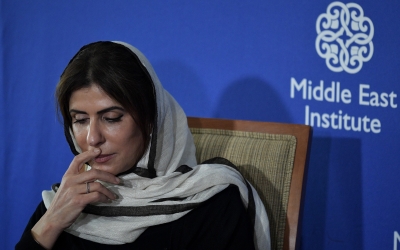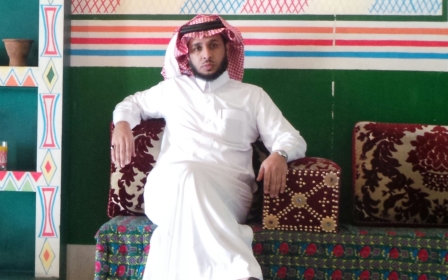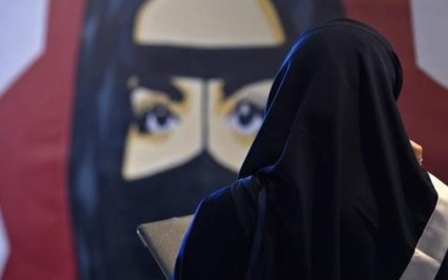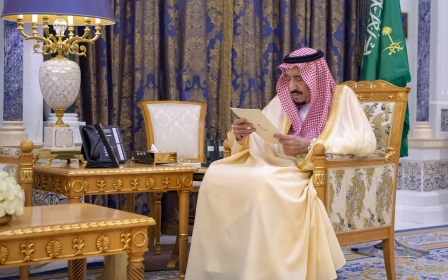Abdullah al-Hamid, pioneering Saudi human rights defender, dies in custody

Dr Abdullah al-Hamid, figurehead of the human rights and political reform movement in Saudi Arabia, has died in Riyadh while serving a sentence for his activism.
The scholar died on Friday morning and has been buried, a source with direct knowledge of the funeral told Middle East Eye.
Hamid was sentenced in 2013 for his work with the Saudi Civil and Political Rights Association (ACPRA), a human rights organisation that he co-founded in 2009, and which worked to highlight abuses in the kingdom.
The activist, who suffered from hypertension, was told three months ago by a doctor that he needed to undergo urgent heart surgery.
However, right groups say his operation was delayed by several months and was due to take place in May or early June 2020.
New MEE newsletter: Jerusalem Dispatch
Sign up to get the latest insights and analysis on Israel-Palestine, alongside Turkey Unpacked and other MEE newsletters
On 9 April he suffered a stroke and fell into a coma in the intensive care unit in a Riyadh hospital. Prisoners of Conscience, a social media account that highlights Saudi political prisoners, described his death as "due to intentional health neglect".
Responding to his death, Ines Osman, director of MENA Rights Group said: "We are devastated to hear of the passing of Abdullah al-Hamid. The Saudi authorities must be held accountable for his death. He was detained in poor conditions and they kept on postponing his surgery. They also denied him to stay in the hospital despite his poor health.
"His death reminds us that he should never have been imprisoned in the first place. At 69 years old, he had spent the past seven years in prison. His only crime was advocating for the advancement of human rights in his country."
Calls for reform
Born in 1950, in northern Saudi Arabia's Buraidah, Hamid quickly rose through Saudi Arabia’s educational establishment, becoming a professor of Arabic literature at Imam Muhammad bin Saud Islamic University in Riyadh in 1988.
A prodigious writer, he published 15 books, dozens of articles and seven collections of poetry. He was an ardent advocate for civil society and argued that the Zakat, a tax each Muslim is religiously obligated to pay, shouldn’t just go to the poor, as is normally the case, but to talented individuals in legal, political and technical fields.
“Scholars in the past have stated that whoever devotes himself to studying a beneficial science for the Muslim nation should be given Zakat,” he wrote.
In other instances, he railed against the narrow focus of the kingdom’s religious establishment.
'The Saudi authorities must be held accountable for his death. He was detained in poor conditions and they kept on postponing his surgery'
- Ines Osman, MENA Rights Group
“Wouldn't the nation be more pious and stronger if the jurists and religion experts wrote more on political obligations in Islam, such as shura [consultative council], human rights, the rights of the accused, the independence of the judiciary, equality and freedom and the like - only one-tenth of what they wrote on miswak (toothbrush) and nail clipping?" he asked in a 2007 book.
Writing for MEE, top Saudi scholar Madawi al-Rasheed said rather than import concepts from abroad, Hamid framed human rights in religious language.
"He fused tradition with new meanings that promised respect for human rights, property and the right to defend oneself against a brutal judiciary and monarchy," she wrote.
"Hamid tried to break the entrenched dividing lines between ideological groups that had in the past rejected each other - Islamists and liberals, for example. He also rejected the sectarian divide between Sunnis and Shia, and endeavoured to defend all prisoners of conscience, in addition to immigrants in Saudi Arabia."
His first arrest came in 1993, after he founded with a group of other academics a committee to demand the kingdom recognise and implement human rights. Two further arrests followed in the following two years.
The scholar was a part of a group of 100 Saudi reformers who in 2003 wrote a historic letter demanding the kingdom shift to a constitutional monarchy, complete with separation of powers and an independent judiciary.
After a group of the signatories, including Hamid, were arrested for their activism, some pledged not to participate in political activities again without first gaining governmental sanction, and were released.
Hamid refused, however, and was subsequently charged in 2004 with "preparing statements against the interest of the state" and sentenced to seven years.
By the time of his release in 2005 after a royal pardon as King Abdullah took the throne, Hamid had become a symbol of political and human rights reform in Saudi Arabia.
In 2009, Hamid co-founded independent human rights organisation ACPRA to support families of those detained without trial or charge. It also reported human rights violations to the UN Human Rights Council and peacefully advocated for a constitutional monarchy.
But authorities refused to grant the group an official licence to operate and banned it in April 2013, confiscating its property and shutting its social media accounts.
Eleven members of the organisation were swept up in a spate of arrests, one as he walked home from morning prayers.
In March 2013, Hamid along with co-founder Mohammed al-Qahtani were sentenced for their work with ACPRA. Charges including inciting disorder by calling for demonstrations, disseminating false information to foreign groups and forming an unlicensed organisation. Hamid was given eleven years, Qahtani ten.
“The sentencing of Dr Abdullah al-Hamid and Muhammad al-Qahtani puts into stark relief the Saudi Arabian authorities’ inability to deal with any opinion that contradicts their own,” said Philip Luther, Middle East and North Africa director at Amnesty International at the time
Hamid is survived by a wife and eight children. His two brothers Issa and Abdulrahman al-Hamid are currently imprisoned for their activism.
Middle East Eye delivers independent and unrivalled coverage and analysis of the Middle East, North Africa and beyond. To learn more about republishing this content and the associated fees, please fill out this form. More about MEE can be found here.





